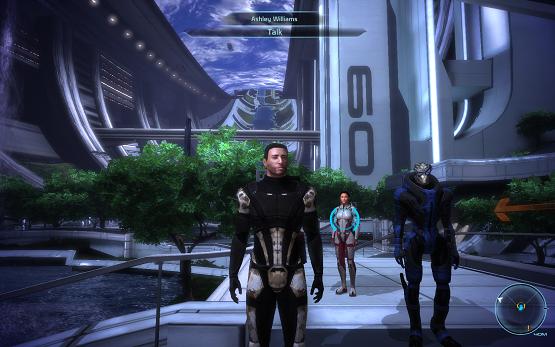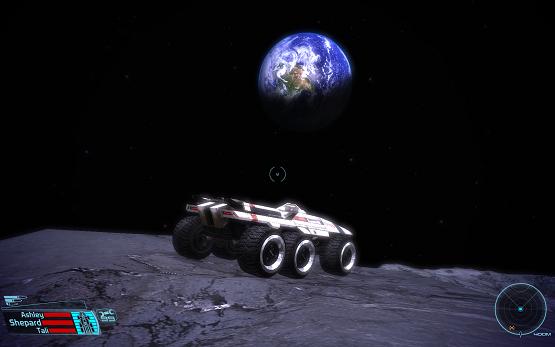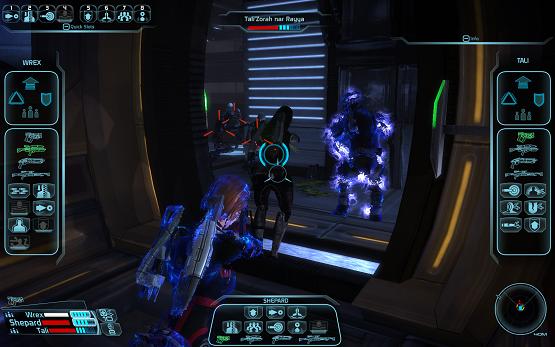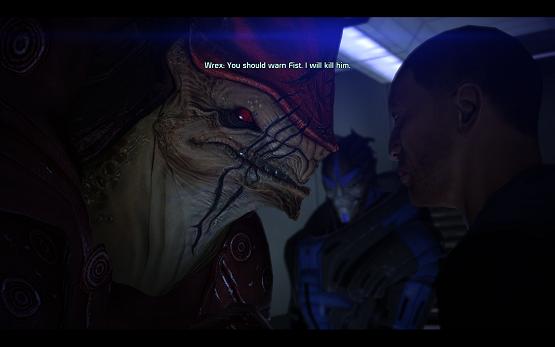
By all reasonable metrics, Mass Effect should be a thoroughly average game. Its FPS mechanics are mediocre at best, the vehicle portion of the game features a tank with laughably bouncy and unrealistic handling, many aspects of its interface are an exercise in frustration and its idea of a massive space station holding millions of inhabitants is a handful of sparsely populated rooms connected by elevators and corridors. Yet for all that it is still easily the best 2008 game that I’ve played so far this year and that’s because it’s a game that is so much more than the sum of its parts.
Bioware’s latest and greatest RPG that was released for the PC only this year is a mishmash of game types. Superficially it bears a striking resemblance to its celebrated predecessor, Knights of the Old Republic, and indeed you can think of it as Bioware’s attempt to make another Star Wars RPG without actually having the rights to the license. However, instead of KOTOR’s turn-based combat mechanics that looked and felt real-time but were really determined by behind-the-scenes hit ratings and die rolls, Mass Effect is a fully-fledged, hit-box based FPS. In addition, certain segments of the game put you in control of the Mako, a sort of all-terrain wheeled tank armed with a cannon and a machinegun. At the same time, it’s also an RPG with a well developed story, nearly enough sidequests to rival Oblivion and a large amount of dialogue, all of which is wonderfully voice acted. Finally, you are given control of a starship with which to explore the galaxy and one of the many ways to earn money is to survey uncharted planets for resources. To long-time computer gamers, all of this is reminiscent of the classic game Starflight which is already sufficient reason to forgive many of the game’s flaws.

As with all RPGs, the game begins with character creation. You’re limited to the surname “Shepherd” since everyone in the game will call you “Commander Shepherd” but it’s up to you to determine your gender and what you look like. You’ll also need to choose a class which will determine what skills you have access to. Soldiers for example, can eventually unlock and effectively use all types of weapons and armors, while Adepts can only use the pistol and wear light armor, but have access to biotic skills that serve as Mass Effect‘s version of magic. Weapons skills serve not only to give a bonus to damage but also affects accuracy by determining the size of the targeting recticle while the appropriate weapon is equipped. While’s it’s possible for a character to use a weapon for which she isn’t skilled, she would be so hopeless at hitting anything with it that it would be pointless to do so.
The biotic abilities behave much as Force powers in KOTOR did, allowing you to throw back enemies, cause direct damage over time or even lift them into the air where you can pepper them full of bullets with impunity. The third route consists of the engineering abilities, which you’ll need to hack open locked containers and into computer systems and in combat can cause the weapons of your enemies to overheat, deplete their shields and even reprogram enemy robotic enemies to join your side. There’s no mana system in Mass Effect. Instead, all abilities have separate cooldowns so it’s to the player’s advantage to use them as often as they become available. As you might expect, playing through the game with different classes will result in a very different experience each time, so that’s a huge plus for the game’s replayability.

As previously mentioned, the combat is a standard shooter with a third-person, over-the-shoulder view, with a cover system similar to that found in Rainbow Six: Vegas and Gears of War. There’s a decent selection of companions available but only two of them can join your party and unlike KOTOR, it isn’t possible to take complete control over them. Instead you can issue squad commands via a menu that pauses the action, but don’t expect too much in the way of precision control. The availability of various powers makes things lively and interesting, but Bioware’s inexperience with action games shows in the awkwardness of the combat animations and the sluggishness of the controls. The combat AI isn’t terribly bright either and you can often see your squad mates waste burst after burst of weapons fire on targets that are behind solid cover. It’s good thing that the ammunition in the game is unlimited. Instead, continuously firing weapons causes the weapon to overheat, forcing its user to stop firing so that it can cool down.
Certain sections of the game allow you to use a wheeled tank, called the Mako, which is armed with both a machine-gun and a cannon. It’s a great idea to allow players to explore the surface of planets in this way, except that the combat is, for the most part, far too easy and feels really stupid. Enemy shots, for example, travel very slowly through the air, so what you’ll end up doing is position the tank with one side facing the enemy so that you can move backwards and forwards to dodge the shots as they arrive while returning fire. The Mako is also implausibly good at navigating rough terrain: it is capable of climbing nearly 90 degree slopes and try as you might, it is impossible to flip it. This isn’t to say that the combat isn’t enjoyable. It’s just that it takes some getting used to, and falls somewhat short of the quality standards that gamers have come to expect from AAA-level action games.

By contrast, the story and world building in the game is nothing short of superb. Mass Effect is set in an original science-fiction universe of Bioware’s creation and it’s obvious that the writers spent a lot of thought and effort in developing a complete and consistent universe. As you wander around, you’ll unlock Codex entries that will explain everything from the biology and politics of alien races to the weapons and tactics used in starship combat. Not everything is directly relevant to the game, but it does help to immerse the player in the universe. The story is appropriately epic in scope and I suspect inspired in part by the Vernor Vinge novel A Fire Upon the Deep, and even if the main quest line is little shorter than I’d have liked, the atempting to complete all of the many optional sidequests will eat up a decent chunk of your time. My main complaint here is that while the graphics look impressive, especially the facial animations that synchronize perfectly with what’s going on and what’s being said, there’s too much sameyness due to the repeated re-use of art assets.
Overall this game is one of the best role-playing games that’s been released over the past few years, and it’s doubly impressive when you consider all that they’ve tried to accomplish in one game: FPS-combat, interstellar travel in a starship, surface exploration, voice acting for every line of dialogue. True, there are glaring flaws in many of its individual components, but it all adds up to an amazing and unforgettable experience. Now, if Bioware had just managed to work in an actual ship-to-ship combat simulator in it, it might just be eligible for all-time greatness.
4 thoughts on “A Game: Mass Effect (PC)”